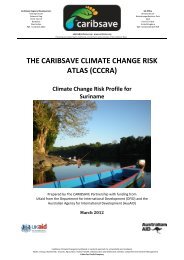You also want an ePaper? Increase the reach of your titles
YUMPU automatically turns print PDFs into web optimized ePapers that Google loves.
5.2. Energy Supply <strong>and</strong> Distribution<br />
5.2.1. Policy<br />
As evident from current energy documents in many countries both in the Caribbean <strong>and</strong> outside, tourism is<br />
not central in the consideration of wider strategies to reduce energy use (Brewster, 2005; Haraksingh,<br />
2001). Yet, as this document has shown for <strong>Turks</strong> <strong>and</strong> <strong>Caicos</strong>, its share in energy use <strong>and</strong> emissions is<br />
considerable, <strong>and</strong> likely to grow in the future, leading to growing vulnerabilities in a business-as-usual<br />
scenario. At the same time, the sector holds great potential for energy reductions <strong>and</strong> should thus be one<br />
of the focus points of policy considerations to de-carbonize isl<strong>and</strong> economies. It is vital for governments to<br />
engage in tourism climate policy, because tourism is largely a private sector activity with close relationships<br />
with the public sector at supranational, national, regional <strong>and</strong> local government levels, <strong>and</strong> through politics,<br />
there is thus an outreach to all tourism actors. Furthermore, governments are involved in creating<br />
infrastructure such as airports, roads or railways, <strong>and</strong> they also stimulate tourism development, as<br />
exemplified by marketing campaigns. The choices <strong>and</strong> preferences of governments thus create the<br />
preconditions for tourism development <strong>and</strong> low-carbon economies. Finally, there is growing consensus that<br />
climate policy has a key role to play in the transformation of tourism towards sustainability, not least<br />
because technological innovation <strong>and</strong> behavioural change will dem<strong>and</strong> strong regulatory environments.<br />
The Climate Change Green Paper identifies a number of actions related to energy use in the tourism sector<br />
in the short, medium <strong>and</strong> long term. In the short term it recommends that the tourism industry is<br />
encouraged to reduce energy use <strong>and</strong> build eco-friendly designs. In the medium term it calls for the<br />
adoption of greener technologies at tourism facilities <strong>and</strong> in the long term for attaining Green Globe, Green<br />
Key <strong>and</strong> Green Hotel certifications (Climate Change Committee, 2011b).<br />
As described earlier <strong>and</strong> pointed out by OECD (2010), emissions of greenhouse gases essentially represent a<br />
market failure where there is little incentive to innovate. It has been shown that the fairest <strong>and</strong> most<br />
efficient way of reducing emissions is to consider increased fuel prices, i.e. to introduce a tax on fuel or<br />
emissions. Carbon taxes may be feasible for accommodation, car transport <strong>and</strong> other situations where<br />
tourism activities cause environmental problems. Taxation is generally more acceptable if taxes are<br />
earmarked for a specific use, which in this case could for instance include incentives for the greening of<br />
tourism businesses. Tax burdens would then be cost-neutral for tourism, but help to speed up the greening<br />
of the sector. If communicated properly, businesses as well as tourists will accept such instruments, <strong>and</strong> the<br />
economic effect can be considerable. The Maldives charge, for instance, US $10 per bed night spent in<br />
hotels, resorts, guesthouses <strong>and</strong> yachts, which accounts for 60% of government revenue (McAller et al.,<br />
2005).<br />
Only limited legislation appears to have been passed in <strong>Turks</strong> <strong>and</strong> <strong>Caicos</strong>, including an additional fuel tax of<br />
50 cents per imperial gallon of fuel, half of which (25 cents) was implemented up to April 2011 (FP <strong>Turks</strong><br />
<strong>and</strong> <strong>Caicos</strong>, 2011b). According to Castalia (2011) the <strong>Turks</strong> <strong>and</strong> <strong>Caicos</strong> Isl<strong>and</strong>s’ legal <strong>and</strong> regulatory<br />
framework does not provide adequate rules <strong>and</strong> incentives for more sustainable production <strong>and</strong><br />
consumption of electricity. For example, there is no obligation for utilities to purchase renewable energy<br />
from third parties when it costs less, no metering or tariff arrangements to integrate such providers <strong>and</strong> the<br />
Building Code <strong>and</strong> Development Manual do not address energy efficiency. The report also highlights that<br />
the existing tariff structures do not encourage efficient use of energy, which is interesting, since the<br />
proposed Energy Conservation Policy put forward aims to introduce new technology in order to lower<br />
electricity costs. As reported in Section 4.2.1, this is not in line with suggestions by supranational<br />
organizations to increase the cost of energy in order to reduce consumption (OECD & UNEP, 2011). PPC has<br />
110





